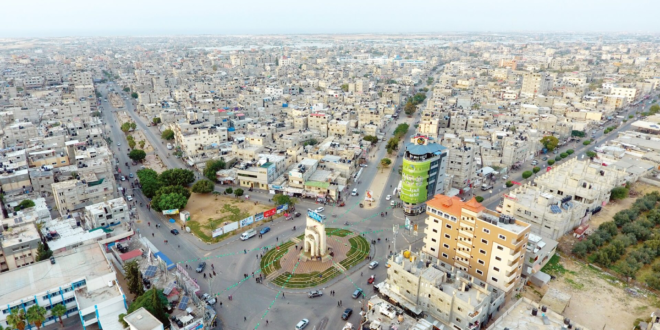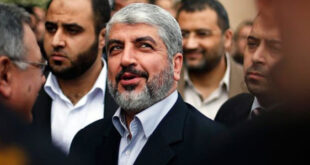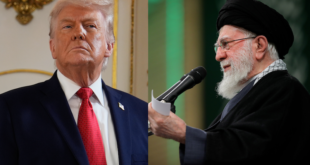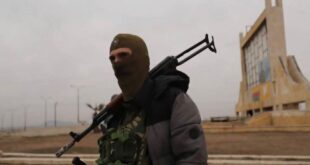The name Rafah once evoked images of sea-breeze evenings, Friday picnics under fig trees, and streets so familiar they felt like the palm of my hand. Now, the name echoes differently — I hear evacuation orders, war maps, and headlines forecasting its erasure.
Israeli Prime Minister Benjamin Netanyahu recently declared the opening of the “Morag Corridor,” a security corridor that slices across the southern part of the Gaza Strip, stretching from the Mediterranean Sea to the East. Named for a former Israeli settlement located between Rafah and Khan Younis, the partition continues Israeli encroachment into the territory. With buffer zones around the border and another corridor in the north, Israel now controls 50% of the Gaza Strip.
To many Palestinians, especially those born and raised in Rafah, the announcement reads like a death sentence. News abounds that Israel plans to annex Rafah, making it a permanent buffer zone. As tanks mass near the border and bulldozers scar the earth, Rafah’s residents, displaced and defiant, wonder whether the city they knew will ever return.
When I read the announcement, it felt like something snapped inside me. Not because the level of horror and tyranny was unexpected — we in Gaza are used to the ground shifting beneath our feet — but because the name Rafah, my Rafah, had always felt like the last place: somewhere they couldn’t take. Suddenly, it was no longer a home but a line on a map, redrawn without our consent.
*
Rafah was never just a city. It was the edge of everything — my family’s story, our grief, and our resilience. For the first twenty-seven years of my life, I never saw what lay beyond it. Born to a family displaced from the village of Barbara in 1948, I knew Rafah as both exile and inheritance, a place wrapped in dust and devotion. Childhood unfolded there under low tin roofs and fig trees, where the smell of baked bread met the call to prayer, and every alleyway held a memory too heavy to forget.
I didn’t know what lay beyond Rafah until 2019. That was the first time I was granted permission to leave Gaza — an experience so rare for someone of my generation that it felt like crossing into another lifetime. I had grown up listening to my grandfather recount stories of Barbara, the village he loved and lost. “It was one of the most beautiful Palestinian villages,” my grandfather Awda would say; his name means return. “Endless groves of olives and oranges… this is my land.” His voice would soften with memory, his blind eyes searching for something no longer there. I never stepped foot in Barbara, but through his words I had walked its orchards, smelled its groves, and tasted its sweetness.
Rafah became the stand-in for that memory. Not the land we had lost, but the one that tried to hold us. The city was small — just 55 square kilometres (35 square miles) — but it held multitudes. Refugee camps in Rafah, like Yibna and Shaboura, were not just names — they were villages reborn in exile, each alley echoing a past that refused to die. I could cross the city on my bicycle in an hour, zigzagging through familiar streets, calling out to neighbors who felt more like cousins. We lived side by side in alleys so close you could hear the neighbors stir their tea.
The walls of Rafah were my entire geography. The sandlot where I raced barefoot in the heat of summer. The makeshift market in the town’s center, spilling over with tomatoes and gossip. The mosque where the entire city seemed to exhale on Fridays. And the road — the only road — that stretched to the sea.
That sea was our myth. Occupied for most of my life until Israel’s “Disengagement” from the Gaza Strip in 2005, it sat at the edge of Rafah like a promise never kept. But my uncle Saad, who used to work as a rescue diver, was allowed to go and took me past the checkpoints. He let me walk on that forbidden beach. I remember the sand between my toes, hot and fine, the kind that slips like silk through your fingers. The waves murmured secrets that had waited generations to be heard. That day, I touched something closer to freedom than I ever had before.
*
For those of us raised in Rafah, it is more than geography. It is also memory. It is meaning and a home. It is also an ongoing sense of our status as refugees. It was in Rafah that I first understood what it meant to be a refugee — but only through stories. As a child, I couldn’t grasp the depth of my grandfather’s trauma. How could I, when my own feet had never had to flee? He would speak of gunshots in the night, of mothers clutching their babies and running toward the unknown. I didn’t live that terror, but I inherited its weight.
I grew into a man carrying that legacy. The word “refugee” was stamped on my ID. My mission became remembering. Retelling. Making sure the world didn’t forget the villages erased in 1948. I thought that would be enough.
It wasn’t.
In 2023, the war came to our doorstep. The house where my wife and daughter slept became a target. I gathered our lives into a single suitcase — documents, diapers, a camera, and a pair of tiny shoes — and fled Gaza for Egypt. We crossed the border as my grandfather once had: unsure if we’d ever return. My daughter, Sarah, was only three years old. She became a second-time refugee before she could write her name.
*
A year and a half into the war, while the world turned a blind eye, the Defence Minister, Israel Katz, called Rafah a security buffer. But on the ground, the message was clear: Rafah would be gone. The last inch of Gaza’s soil might no longer be ours.
What does it mean to erase a city?I sat in silence, my phone screen glowing in the dark. What does it mean to erase a city? Not just its buildings — but its people, their memories, their names? I thought of my grandfather, of the lemon tree he planted in exile. I thought of the courtyard where my daughter took her first steps.
Now, there is nothing left to return to.
As I held my daughter Sarah close, I felt the words form in silence: “What kind of life will she live in her second exile when she hasn’t even lived her first?” I couldn’t push the thought away. “Will the curse of Palestinian exile haunt the last of us into disappearance? What does this world want from us?” These weren’t rhetorical questions — they were the echo in my head as I watched Sarah sleep, her tiny frame curled beside mine, the world outside her far too violent for the dreams she deserves.
*
Many residents of Rafah shared my mourning.
Mothers like Salsabeel Jabr Abdullah Awad, 30, do not recall Rafah in generalities. Her childhood wasn’t just shaped there — it was etched into the walls and floors of a cramped house in Shaboura camp. The floor was not tiled; it was just a hard mat laid over dusty concrete. Three small rooms wrapped around a shared courtyard. There was a steep, handmade staircase her father built with his own hands, leading to the rooftop where they would hang laundry, sun themselves, or roast seeds in a dented pan under the afternoon sun.
In the front room, which her father called “the men’s room,” a steel desk sat beside bookshelves filled with the worn spines of Arabic literature. The room had two doors — one leading out to the alley, the other opening inward to their home. In summer, her father would open both to catch the breeze drifting through the narrow alleys of the camp. When the wind came through, it carried more than air. It brought the scent of roasted coffee from neighbors and the thud of soccer balls bouncing off concrete walls.
There were seven sisters in that small house. They would gather around the same battered table to share food and tea, with sugar so sweet it clung to the teeth. The bath had a tub, but no one bathed in it — it was for blankets and winter laundry. The house was humble, the roof low, but inside there was warmth. Laughter. A sense of safety.
When her father, a retired Arabic teacher, finally saved enough to build a new home, her mother cried as they left the old one. The new house, though larger, felt empty at first. But over time, it became the place they grew up. The place where they celebrated graduations, weddings, and Eids. Her father, a proud man who had studied in Alexandria and taught in Libya, denied himself comforts to send his daughters to university.
“He never let us skip breakfast,” she says. “He had rules — like smashed beans must be on the table. Sweet tea. No exceptions. We followed those rules like rituals. I teach my own children the same ones now.”
Salsabeel now lives in northern Gaza with her husband and two children. Their home has been damaged. They have fled multiple times. Her voice trembles when she describes the war as the darkest period in her life. But it was the news of Netanyahu’s corridor — of Rafah being turned into a military buffer — that cut deepest.
“What does it mean to annex Rafah? Does it mean I won’t go back to my father’s house? That Rafah won’t exist?”
Salsabeel Jabr Abdullah AwadShe had been scrolling through her phone when she saw the headline. Her breath caught. Her fingers froze.
“What does it mean to annex Rafah?” she whispered to herself. “Does it mean I won’t go back to my father’s house? That Rafah won’t exist?”
Her father had poured his life into that home. He had bought the land before she was born, finished paying it off ten years later, then built room by room, floor by floor. The pantry was stocked with jars of pickled olives and thyme. There was an iron door on a small shed in their garden. When her father took her there, they would sleep under mosquito nets and wake with the sun shining through the lemon tree.
“I know every corner of that city,” she says. “Every shopfront, every shortcut, every neighbor’s face. Rafah isn’t just where I’m from — it’s where I am. I left for university and felt like I had crossed borders. But the moment we re-entered Rafah, through Kfar Morag, it was like my lungs started working again.”
Even now, with the corridors turned into military zones, and tanks on the move, the muscle memory of Rafah remains. Salsabeel closes her eyes and sees her father’s yellow car, rattling over potholes as they drove to the sea. Her little sister in the trunk, squealing with delight. Her mother in the kitchen, sorting greens. Her father sitting cross-legged with his grandkids, laughing as he peeled lemons.
Her father, now elderly and proud, still refuses charity. “What will happen to him?” she asks. “A man who gave everything for his land — will he end up sleeping on a sidewalk?”
The Morag Corridor might claim to offer security to Israel. But what it erodes — quietly, daily — is dignity. Memory. Belonging. The corridor may be a geopolitical strategy for some, but to her — and to thousands of others — it’s a sentence. A threat. A line they’re told not to cross.
This story is not finished. The tanks are still there and our city is currently being razed to the ground. The families, though scattered, still whisper the name of their city as if speaking it might summon it back.
 Eurasia Press & News
Eurasia Press & News



